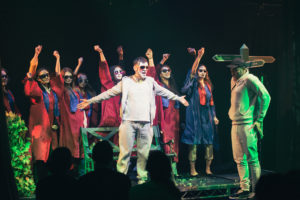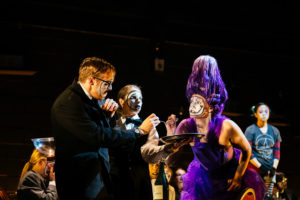Dan Herd is directing Mountview’s upcoming production of The Wolves by Sarah DeLappe, alongside his roles as Director of Public Performance and Acting tutor at Mountview. We caught up with Dan about his work at Mountview and the highlights and challenges of directing The Wolves.
What inspired you to become a theatre director?
My first experience of directing was when I was 13. I persuaded my school to let me direct a play, which was my awful adaptation of the film The Sting. My next stint as a director was much more successful, as the playwright attended the performance and offered to mentor me. After school I studied theatre at Trinity College Dublin, while also spending the holidays as a director on the first Old Vic New Voices programme. After university, I worked as a freelance director at theatres including the Lyric Hammersmith and Soho Theatre.

Boy, directed by Dan Herd. Photo by John Hunter at thisisruler.net
Why did you choose to direct The Wolves?
As Director of Public Performance, I oversee our third-year shows: this includes selecting material, overseeing casting and managing each production through to their performances. When we were choosing our 21/22 shows, we wanted the final Acting productions to connect with each other and eventually landed on ENRON and The Wolves. They are both contemporary masterpieces with physical styles that offer a commentary on national identity and how people see their country. ENRON features the entire male Acting cohort and looks at men carving out their paths in a masculine world, while the all-female cast of The Wolves looks at a group of girls becoming women and the challenges they face.
The Wolves is written very musically, full of overlapping conversations and stories, which chimes well with my acting ethos. I teach actors as if they are members of an orchestra. If you play the flute, you can’t suddenly start on the drums: you have to focus on how exciting and interesting you can be within your own part. The overlapping lines of the play and staging in the round mean that wherever you sit in the theatre, you will experience this play completely differently.
Do you have a favourite section of the play?
We haven’t started rehearsals yet, so I know this will change. Lines become favourites to me because of how the actor performs them. That said, one of the most interesting things to me is the constant dichotomies explored between different characters. For example, in the first scene two of the girls are discussing genocide, while simultaneously another pair of girls are discussing whether they should use tampons or pads when playing football. Both pairs don’t really know what they’re talking about, but want to sound like they do!
What is it like working in a flexible theatre space like the Backstage Theatre?
It’s been great for this play, as it means we can AstroTurf the whole theatre! For each show we do, we can make it into a completely different setting. There are so many possibilities for this space and one of the challenges is to avoid overdoing it.
The size of the space poses a unique challenge too, as performers have to be so precise with their actions. We also have to make sure that the play is communicated to the entire audience. There is a ‘choose your own adventure’ element as audiences pick where they sit, but the staging and construction of the story still has to make sense for everyone.

King Lear, directed by Dan Herd. Photo by Cesare de Giglio.
What is it like directing students, instead of professional actors?
A big difference for me is that I’ve also taught these students throughout their training. I’ve known them for almost 3 years and have seen them change and grow. There’s an innate sense of trust, both with me and between the students. Everyone knows everyone, unlike in a professional production where it can be awkward at the start. It also means I have taught them different methods and approaches that I can then refer back to when directing them. If I ever went back to directing professionally, I think the lack of this shared language would be really difficult.
At Mountview, I think our students are generally much hungrier for the strange and the exciting, rather than obsessing about what looks like good acting. They aren’t interested in looking cool: they want to do things that no-one else would do.
Why should people see this play?
First and foremost, people should see it because of the students. They’re all fantastic young actors who are on the cusp of completing their training. If you see any of our undergraduate shows this season, you will be seeing performers a second before you’d have to pay a lot of money to see them elsewhere!
I think The Wolves also offers something for everyone. If you’ve been a teenage girl, you might recognise parts of yourself in the play. If you haven’t, it’s a fascinating glimpse into a different mindset and experiences. The actors in the play have all been teenage girls and I’m really looking forward to them bringing this expertise to the show.
